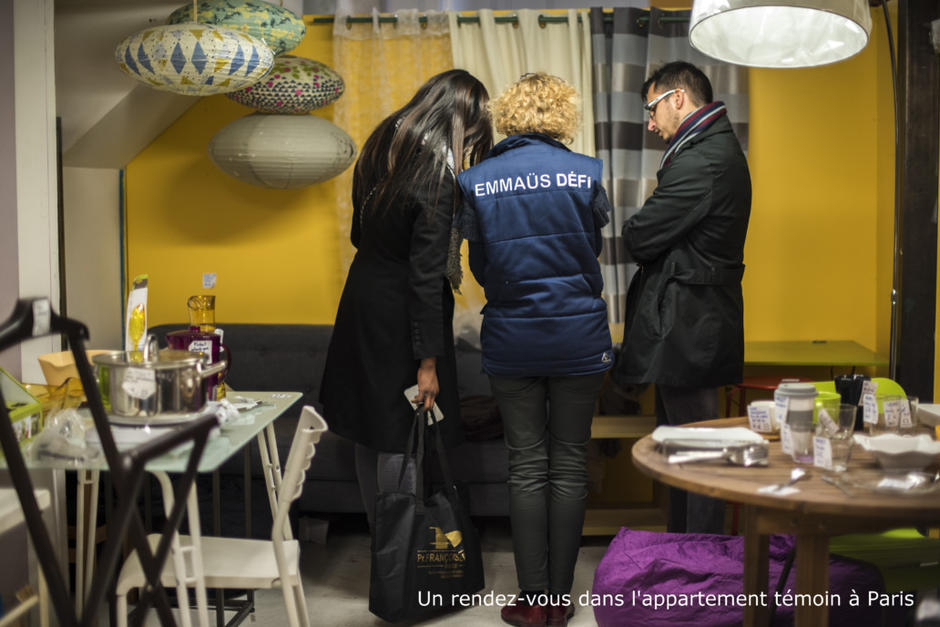
Social & Employment
Location:
Aubervilliers (France)
Sponsor:
Xavier Metteil
Grant:
€25,000 at the 10/4/18 Selection Committee.
Project Owner
Founded in 2007, Emmaüs Défi is a member of the Emmaus Movement and, like the wider movement, seeks to combat severe exclusion by employing innovative solutions. A back-to-work scheme, Emmaüs Défi has 140 staff on back-to-work contracts and 66 permanent employees.
Its main and most well-known income-generating activity is collecting, sorting and reselling furniture and goods. But Emmaüs Défi does much more than that. The organisation has also developed the Premières Heures (first working hours) scheme to ease rough sleepers back into work, the Convergences programme in order to benefit from a network of partners specialising in housing, health and employment issues, and neighbourhood charity collection points where the organisation picks up donations.
A furniture bank since 2012
One of Emmaüs Défi's initiatives is the Banque solidaire de l'équipement (BSE or Furniture Bank in English). Launched in early 2012, the furniture bank enables people who are leaving behind insecure housing and are moving into long-term housing to buy the basics needed to kit out their new homes at an affordable price. The furniture bank collects unsold stock and end-of-lines from partner firms and then sells these goods at an affordable price.
The furniture bank was set up on Emmaüs Défi's site and has capitalized on the organisation's own ecosystem and particularly on l'Equipe, the social "back-to-work" enterprise created by Emmaüs Défi in 2017 to train employees in logistics. A home delivery service is provided for customers who buy their household goods and furniture from the organisation. All the logistics are managed by Emmaüs Défi back-to-work scheme employees.
Who is eligible? Furniture bank beneficiaries are people who are now accessing stable housing having lived in insecure accommodation (temporary accommodation centres, shelters etc). They are referred to the furniture bank by non-profits and social workers. They can then set up home properly and quickly and sustainably leave behind an insecure situation.
A first spin-off in 2016 and plans for another furniture bank in 2018
A first spin-off branch of the furniture bank was opened in Lyon in 2016 and the next phase involves opening a third bank in Seine-Saint-Denis. The aim is to meet the needs of local residents while working with local social structures. The Seine-Saint-Denis furniture bank aims to help 100 households in its first year, 300 in its second, and then 500 a year thereafter. Emmaüs Défi is seeking to ensure that this branch of the bank is economically viable after three years.
Premises have already been made available to the organisation. And with the support of the foundation, the next few phases before opening will involve setting up the store (construction and layout), operational arrangements (HR and logistics), and mobilising social action prior to opening. The store will be a further link in the chain of solidarity forged over the past few years by the Emmaus Movement.
"For many years, Veolia Eau Ile-de-France has been a major player in the solidarity-based city by addressing the issue of the water vulnerability of individual users and users in jointly-owned buildings experiencing difficulties. An innovative support mechanism, called Eau Solidaire, has been set up in SEDIF* local districts. By acting as the sponsor for this project, I want the furniture bank to benefit from this solidarity dynamic established by the water service by offering it access to the expertise acquired by the Eau Solidaire service, putting the organisation into contact with our local partners who can help keep housing up to standard, and by helping it to integrate more effectively into the life of Aubervilliers and Seine-Saint-Denis through my network of contacts (politicians, associations etc)."
Xavier Metteil
* 8.0pt;line-height:116%;color:#181818">Syndicat des eaux d'Ile-de-France (Paris region water authority).

